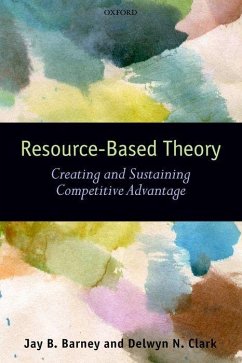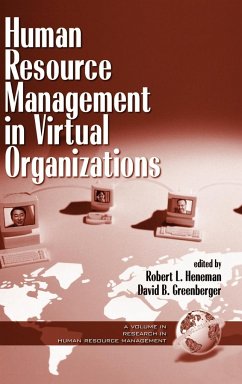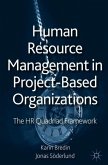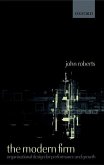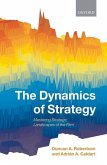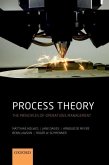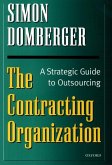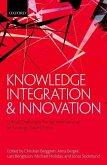- Gebundenes Buch
- Merkliste
- Auf die Merkliste
- Bewerten Bewerten
- Teilen
- Produkt teilen
- Produkterinnerung
- Produkterinnerung
The 'Resource-Based View of the Firm' has emerged as one of the dominant perspectives used in strategic management. It addresses the fundamental research question of strategic management: Why it is that some firms persistently outperform others? Resource-Based Theory provides a considered overview of this theory from one of its key thinkers.
Andere Kunden interessierten sich auch für
![Human Resouce Management in Virtual Organizations (Hc) Human Resouce Management in Virtual Organizations (Hc)]() Pauline B. InnisHuman Resouce Management in Virtual Organizations (Hc)107,99 €
Pauline B. InnisHuman Resouce Management in Virtual Organizations (Hc)107,99 €![Human Resource Management in Project-Based Organizations Human Resource Management in Project-Based Organizations]() Karin BredinHuman Resource Management in Project-Based Organizations77,99 €
Karin BredinHuman Resource Management in Project-Based Organizations77,99 €![The Modern Firm The Modern Firm]() John RobertsThe Modern Firm206,99 €
John RobertsThe Modern Firm206,99 €![The Dynamics of Strategy The Dynamics of Strategy]() Duncan A RobertsonThe Dynamics of Strategy154,99 €
Duncan A RobertsonThe Dynamics of Strategy154,99 €![Process Theory Process Theory]() Matthias HolwegProcess Theory137,99 €
Matthias HolwegProcess Theory137,99 €![The Contracting Organization The Contracting Organization]() Simon DombergerThe Contracting Organization271,99 €
Simon DombergerThe Contracting Organization271,99 €![Knowledge Integration and Innovation Knowledge Integration and Innovation]() Bruce RosenblumKnowledge Integration and Innovation166,99 €
Bruce RosenblumKnowledge Integration and Innovation166,99 €-
-
-
The 'Resource-Based View of the Firm' has emerged as one of the dominant perspectives used in strategic management. It addresses the fundamental research question of strategic management: Why it is that some firms persistently outperform others? Resource-Based Theory provides a considered overview of this theory from one of its key thinkers.
Hinweis: Dieser Artikel kann nur an eine deutsche Lieferadresse ausgeliefert werden.
Hinweis: Dieser Artikel kann nur an eine deutsche Lieferadresse ausgeliefert werden.
Produktdetails
- Produktdetails
- Verlag: Oxford University Press (UK)
- Seitenzahl: 328
- Erscheinungstermin: 5. Juli 2007
- Englisch
- Abmessung: 235mm x 165mm x 24mm
- Gewicht: 626g
- ISBN-13: 9780199277681
- ISBN-10: 0199277680
- Artikelnr.: 22581053
- Herstellerkennzeichnung
- Libri GmbH
- Europaallee 1
- 36244 Bad Hersfeld
- gpsr@libri.de
- Verlag: Oxford University Press (UK)
- Seitenzahl: 328
- Erscheinungstermin: 5. Juli 2007
- Englisch
- Abmessung: 235mm x 165mm x 24mm
- Gewicht: 626g
- ISBN-13: 9780199277681
- ISBN-10: 0199277680
- Artikelnr.: 22581053
- Herstellerkennzeichnung
- Libri GmbH
- Europaallee 1
- 36244 Bad Hersfeld
- gpsr@libri.de
Jay B. Barney is a Professor of Management and holds the Chase Chair in Strategic Management at the Fisher College of Business at The Ohio State University in Columbus, Ohio. Best known for his work on resource-based theory, he has published over 75 articles in the field of strategic management, along with four books. Professor Barney has also served in a variety of editorial positions (at The Journal of Management, Organization Science, and other journals), received an honorary Ph.D. from Lund University, was elected as a Fellow of the Academy of Management, and received the Irwin Outstanding Educator Award from the Business Policy and Strategy Division of the Academy of Management. Professor Barney also consults with a wide variety of private and public sector organizations, including, most recently, American Electric Power, Nationwide Insurance, and Columbus Public Schools. Delwyn N. Clark is the Executive Director Research and a Professor of Strategic Management at Waikato Management School. Professor Clark's research interests provide intellectual contributions to strategy theory, practice and teaching. She is developing new theory on innovation, entrepreneurial processes and the resource based view of the firm. In addition to studying strategy models and processes, she has recently examined e-Business practices in New Zealand organizations (as part of a FRST-funded programme). Several of her in-depth, Harvard-style, strategy case studies have been published in the Case Research Journal and in a book, Strategic Management Cases (Pearson, 2001). In 2002, Delwyn was the recipient of one of the inaugural New Zealand Tertiary Teaching Excellence Awards for Sustained Excellence.
* Part I: RESOURCE-BASED THEORY
* 1: The strategic management question and the emergence of
resource-based theory
* 2: Strategic factor markets and competitive advantage
* 3: Firm resources and sustained competitive advantage
* Part II: RBT AND ORGANIZATIONAL CAPABILITIES
* 4: Culture as a source of sustained competitive advantage
* 5: Trust as a source of sustained competitive advantage
* 6: Human resources as a source of sustained competitive advantage
* 7: Information technology as a source of sustained competitive
advantage
* Part III: RBT AND ORGANIZATIONAL STRATEGIES
* 8: Resource-based theory and vertical integration
* 9: Resource-based theory and corporate diversification
* 10: Resource-based theory and mergers and acquisitions
* Part IV: RBT: THE RESEARCH FRONTIER
* 11: Resource-based theory: empirical research
* 12: The future of resource-based theory
* 1: The strategic management question and the emergence of
resource-based theory
* 2: Strategic factor markets and competitive advantage
* 3: Firm resources and sustained competitive advantage
* Part II: RBT AND ORGANIZATIONAL CAPABILITIES
* 4: Culture as a source of sustained competitive advantage
* 5: Trust as a source of sustained competitive advantage
* 6: Human resources as a source of sustained competitive advantage
* 7: Information technology as a source of sustained competitive
advantage
* Part III: RBT AND ORGANIZATIONAL STRATEGIES
* 8: Resource-based theory and vertical integration
* 9: Resource-based theory and corporate diversification
* 10: Resource-based theory and mergers and acquisitions
* Part IV: RBT: THE RESEARCH FRONTIER
* 11: Resource-based theory: empirical research
* 12: The future of resource-based theory
* Part I: RESOURCE-BASED THEORY
* 1: The strategic management question and the emergence of
resource-based theory
* 2: Strategic factor markets and competitive advantage
* 3: Firm resources and sustained competitive advantage
* Part II: RBT AND ORGANIZATIONAL CAPABILITIES
* 4: Culture as a source of sustained competitive advantage
* 5: Trust as a source of sustained competitive advantage
* 6: Human resources as a source of sustained competitive advantage
* 7: Information technology as a source of sustained competitive
advantage
* Part III: RBT AND ORGANIZATIONAL STRATEGIES
* 8: Resource-based theory and vertical integration
* 9: Resource-based theory and corporate diversification
* 10: Resource-based theory and mergers and acquisitions
* Part IV: RBT: THE RESEARCH FRONTIER
* 11: Resource-based theory: empirical research
* 12: The future of resource-based theory
* 1: The strategic management question and the emergence of
resource-based theory
* 2: Strategic factor markets and competitive advantage
* 3: Firm resources and sustained competitive advantage
* Part II: RBT AND ORGANIZATIONAL CAPABILITIES
* 4: Culture as a source of sustained competitive advantage
* 5: Trust as a source of sustained competitive advantage
* 6: Human resources as a source of sustained competitive advantage
* 7: Information technology as a source of sustained competitive
advantage
* Part III: RBT AND ORGANIZATIONAL STRATEGIES
* 8: Resource-based theory and vertical integration
* 9: Resource-based theory and corporate diversification
* 10: Resource-based theory and mergers and acquisitions
* Part IV: RBT: THE RESEARCH FRONTIER
* 11: Resource-based theory: empirical research
* 12: The future of resource-based theory

